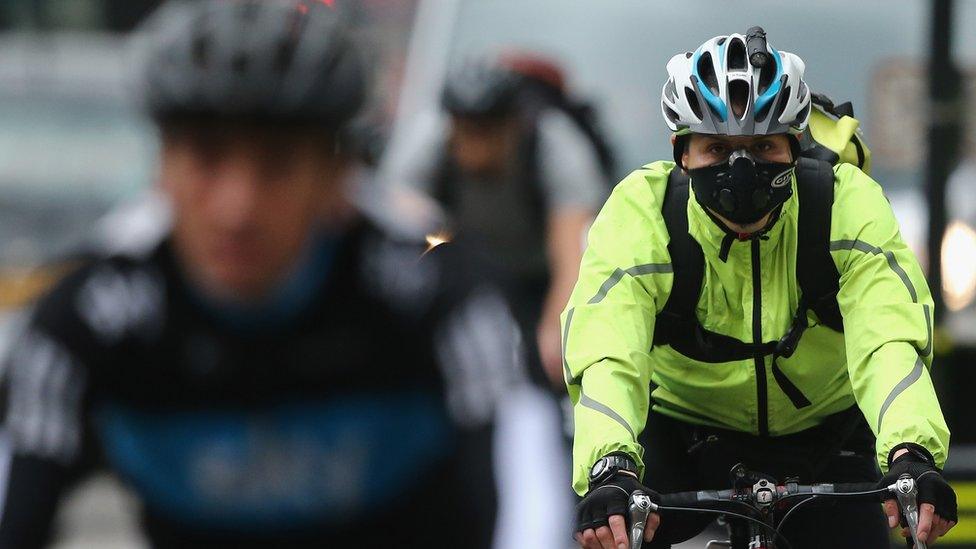Government bid to delay air pollution plan fails
- Published

Air pollution has been described as a "public health emergency"
The UK Government has lost a court bid to delay publication of its air pollution strategy, and must now release it before the June election.
Courts had given the government until Monday 24 April to set out draft guidelines to tackle illegal levels of nitrogen dioxide (NO2) pollution.
But late last week, ministers lodged an application to delay their release until after the general election.
They argued that publication would fall foul of election "purdah" rules.
These limit government announcements with political implications during the election period.
But on Thursday, the High Court ordered the draft plans to be published on 9 May, five days after the local elections, but long before the general election on 8 June.
The date for publication of the final document remains unchanged on 31 July.
Reality Check: Does pollution cut short 40,000 lives a year?
Green group wins air pollution court battle
During the hearing, government barrister James Eadie QC told Mr Justice Garnham that publication would drop a "controversial bomb" into the mix of local and national elections.
The new strategy was requested last year, after a court ruled that existing measures to tackle air pollution proposed by the government did not meet the requirements of law.
But the High Court decided that purdah was a convention only and did not override legal obligations to clean up the air. Additionally, the impact on public health would exempt it from the purdah rules anyway.
Legal battle
Thursday's decision is the latest development in a long-running legal action brought against the government by a group of environmental lawyers, ClientEarth. The campaigners began proceedings after the UK breached EU limits for nitrogen dioxide (NO2) in the air.
These limits were introduced by EU law in 1999 and were to have been achieved by 2010. Some 37 out of 43 regions in the UK have been in breach over levels of NO2, one of several nitrogen oxide (NOx) pollutants.
Diesel vehicles are a key source of NOx emissions, and NO2 has been linked to a range of respiratory illnesses. Around 40,000 people are estimated to die prematurely every year in the UK because of poor air quality.
Reacting to the ruling on Thursday, James Thornton, ClientEarth's chief executive, said: "ClientEarth is delighted with Justice Garnham's decision.
"The judge listened to the government's claims that it needed to delay taking care of public health, but he rejected them vigorously and is keeping the government to the deadline of releasing the final plan on 31 July."
The government could yet appeal the ruling, which might effectively delay the process anyway.
Mr Thornton said: "I would urge them not to appeal. I would say: 'get to work'. Enough dither, enough delay, clean up the air."
Reluctant decision
Representing the government, Mr Eadie QC said the application had been brought with considerable reluctance and was not "some sort of guise or demonstration of lack of commitment to improving air quality".
In April 2015, ClientEarth won a Supreme Court ruling against the government over air pollution levels.
That judgment ordered ministers to come up with a plan to bring down air pollution to within legal limits as soon as possible.
But ClientEarth was dissatisfied with those proposals, and took the government to the High Court in a judicial review, which it won.
London's Labour Mayor, Sadiq Khan, said: "I am pleased that the government will now have to face its responsibilities sooner rather than later.
"Ministers were dragged kicking and screaming to face the huge scale of this health crisis, but rather than take immediate action to protect the public they deliberately used the election as a smokescreen to hold back their plan."
He added: "I hope that after this appalling delay, this Government delivers a strong plan to finally get a grip on this issue and urgently introduces a diesel scrappage fund to rid our streets of the dirtiest cars."
Follow Paul on Twitter., external